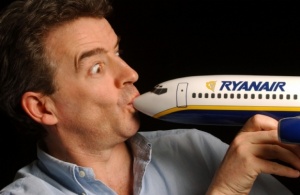Ryanair’s Michael O’Leary calls for hotel tax

Ryanair chief executive Michael O’Leary has called for taxation to be switched from airline to hotel rooms to sustain Britain’s tourism economy, in a move that would mirror the United States policy.
The outspoken aviation mogul said a £1 per night tax on rooms could recover a significant proportion of what is now raised by APD, while encouraging both outbound travel from the UK and international visitors to the country by cutting costs.
His comments come as the government concludes its consultation on the future of APD. Possible options include raising APD on short-haul flights and relaxing it on long-haul; scrapping the controversial banding system which works adversely against regions such as the Caribbean (passengers flying from the UK to Hawaii are taxed less than those going to Jamaica, even though Hawaii is 3,000 miles farther away); as well as extending coverage to private jets
O’Leary told The Telegraph: “I understand that the Government needs to raise tax, and APD has nothing to do with emissions – it’s just a tax grab. A more sensible way of raising money would be a tax on hotel rooms. There are far more hotel beds than plane seats, and it would raise money from domestic and business travellers, too. No one will notice £1 on top of their hotel room, but £12 or more on top of a plane ticket is putting off travellers.”
“Visitor numbers to Britain have fallen from 33 million to 29.5 million since 2007. That represents around £2 billion in lost revenue each year, going by Visit Britain’s own statistics, or roughly equivalent to what APD brings in,” he added.
ADVERTISEMENT
Hotel occupancy taxes are imposed by authorities in the United States, but would be resisted by hoteliers here.
However hoteliers have answered back, saying that VAT is already charged on rooms, and is regressive.
Simon Vincent of the Hilton group said: “The UK hotel industry is subject to the second-highest rate of VAT in the EU, and we face strong competition from our European counterparts with their lower rates of VAT. This is a time when we should be supporting our tourism industry and providing more compelling reasons for people to visit rather than suggesting additional taxes.
Passengers currently pay between £12 and £24 on all short-haul flights from Britain, and between £60 and £170 on all medium-haul and long-haul journeys.
Any changes to APD would come into effect next year, according to a Treasury spokesman.
The UK is also set to enter the EU Emissions Trading Scheme (ETS) next year, under which airlines will have to buy credits from renewable-energy or emission-reduction schemes to cover any growth in CO2 emissions.
Airlines say that the ETS is likely to lead to further fares hikes, but the Government recently ruled out the possibility of cutting the rate of APD to offset the effects of the introduction of the scheme.

